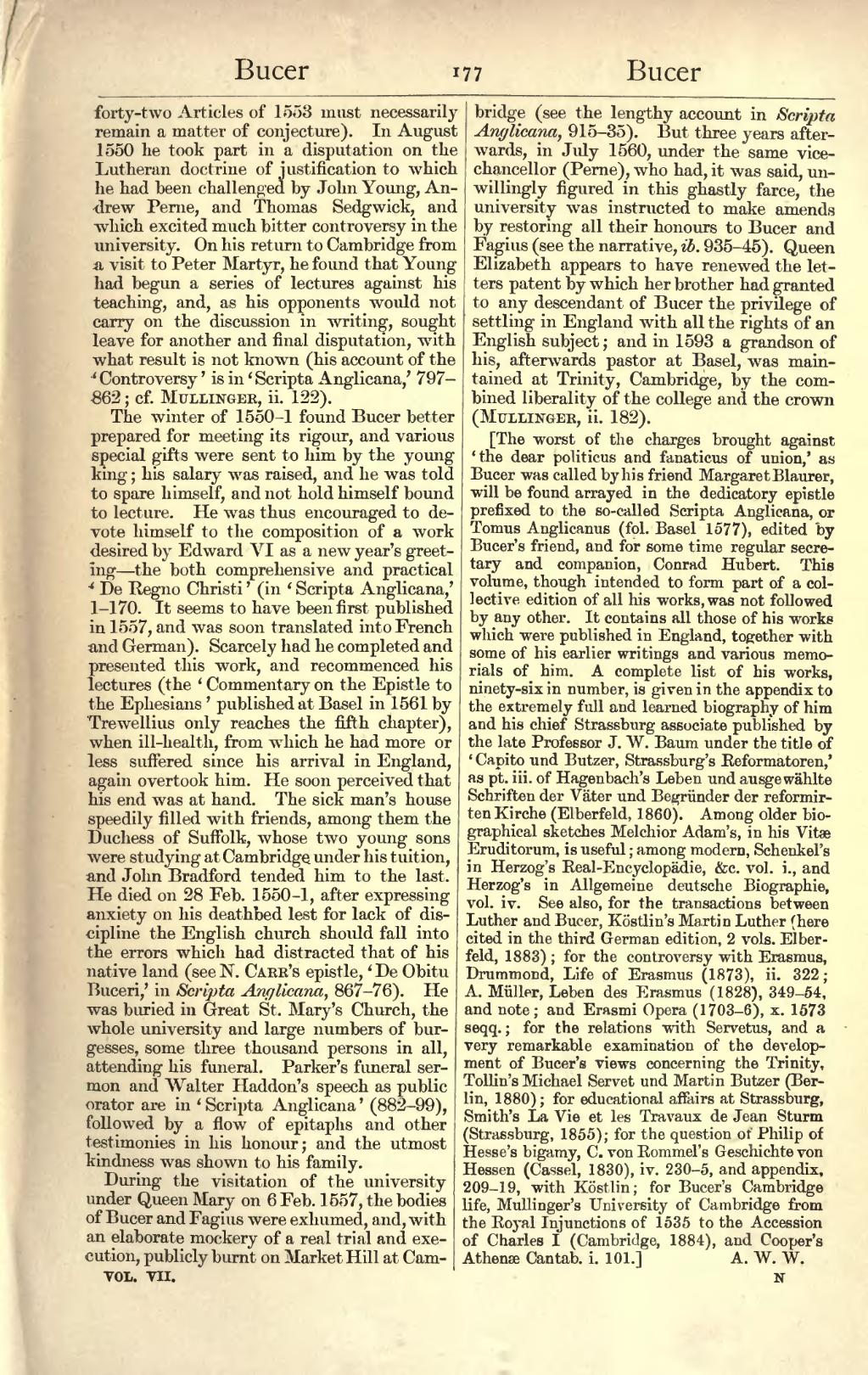forty-two Articles of 1553 must necessarily remain a matter of conjecture). In August 1550 he took part in a disputation on the Luthern doctrine of justification to which he had been challenged by John Young, Andrew Pern, and Thomas Sedgwick, and which excited much bitter controversy in the university. On his return to Cambridge from an visit to Peter Martyr, he found that Young had begun a series of lectures against his, teaching, and, as his opponents would not curry on the discussion in writing, sought leave for another and final disputation, with what result is not known (his account of the ‘Controversy’ is in ‘Scripts Anglicana,' 797- 862; cf. Mullinger, ii. 122).
The winter of 1550-1 found Bucer better prepared for mueting its rigour, and various special gifts were sent to him by the young king; his salary was raised, and he was told to spare himself, and not hold himself bound to lecture. He was was encouraged to devote himself to the composition of a work desired by Edward VI as a new year’s greeting-the both comprehensive and practical ‘De Regus Christi’ (in ‘Scripta Anglicana,' 1-170. It seems to have beenfirst published in 1557, and was soon translated into French and German). Scarcely had he completed and presented this work, and recommenced his lectures (the ‘Commentary on the Epistle to the Ephesians’ published at Basel in 1561 by Trewellius only reaches the fifth chapter), when ill-health, from which he had more or less suffered since his arrival in England, again overtook him. He soon pemeived that his end was at hand. The sick man’s house speedily filled with friends, among them the Duchess of Suffolk, whose two young sons were studying at Cambridge under his tuition, and John Bradford tended him to the last. He died on 28 Feb. 1550-1, after expressing anxiety on his deathbed lest for lack of discipline the English church should full into the errors which had distracted that of his native land (see N. Carr;s epistle, ‘De Obitu Buceri,' in Scripta Anglicana, 867-76). He was buried in Great St. Mary's Church, the whole university and large numbers of burgesses, some three thousand persons in all, attending his funeral. Parker’s funeral sermon and Walter Haddon's speech as public orator are in ‘Scripta Auglicana’ (882-99), followed by a flow of epitaphs and other testimonies in his lxunuur; and the utmost kindness was shown to his family.
During the visitation of the university under Queen Mary on 6 Feb. 1557, the bodies of Bucer and Fagius were exhumed, and, with an elaborate mockery of a real trial and execution, publicly burnt on Market Hill at Cambridge (see the lengthy account in Scripta Anglicana, 915-35). But three years afterwards, in July 1560, under the same vice-chancellor (Perne), who had, it was said, unwillingly figured in this ghastly farce, the university was instructed to make amends by restoring all their honours to Bucer and Fagius (see the narrative, ib. 935-45). Queen Elizabeth appears to have renewed the letters patent by which her brother had granted to any descendant of Bucer the privilege of settling in England with all the rights of an English subject; and in 1593 a grandson of his, afterwards pastor at Basel, was maintained ut Trinity, Cambridge, by the combined liberality of the college and the crown (Mullinger, ii. 182).
[The worst of the charges brought against ‘the dear politicus and fanaticus of union,' as Bucer was called by his friend Margaret Blaurer, will be found arrayed in the dedicatory epistle prefixed to the so-called Scripta Anglicana, or Tomus Anglicanus (fol. Basel 1577), edited by Bucer‘s friend, and for some time regular secretary and companion, Conrad Hubert.. This volume, though intended to form part of a collective edition of all his works, was not followed by any other. It contains all those of his works which were published in England, mqether with some of his earlier writings and various memorials of him. A complete list of his works, ninety-six in number, is given in the appendix to the extremely full and learned biography of him and his chief Suassburg associate published by the late Professor J. W. Baum under the title of ‘Capita und Butzer, Strassburg’s Reformatoren,’ as pt. iii. of Hagenbach’s Leben und ausgewählte Schriften dur Väter und Begründer der reformirten Kirche (Elberfeld, 1860). Among older biographical sketches Melchior Adams, in his Vitæ Eruditorum, is useful; among modern, Schenkel's in Herzog’s Real Encyclopädie, &c. vol. i., and Herzog’s in Allgemeine deutsche Biographie, vol, iv. See also, for the transactions between Luther and Bucer, Köstler’s Martin Luther (here cited in the third German edition, 2 vols. Elberfeld, 1883); for the controversy with Erasmus, Drummond, Life of Erasmus (1873), ii, 322; A. Müller, Leben des Erasmus (1828), 349~54. and note; and Erasmi Opera (1703-6), x. 1573 seqq.; for the relations with Servetus, and a very remarkable examination of the development of Bucer's views concerning the Trinity. Tollin's Michael Servet und Martin Butzer (Berlin, 1880); for educationnal affairs at Srassburg, Smith’s In Vie et les Travaux de Jean Sturm (Strassburg, 1855); for the question of Philip of Hesse‘s biography, C. von Rummel's Geschichhe von Hessen (Cassel, 1830), iv. 230-5, and appendix, 209-19, with Kasnin; for Bucer's Cambridge life, Mullinger’s University of Cambridge from the Royal Injunctions of 1535 to the Accession of Charles I (Cambridge, 1854), and Cooper's Athenæ; Cantab. i. 101.]
